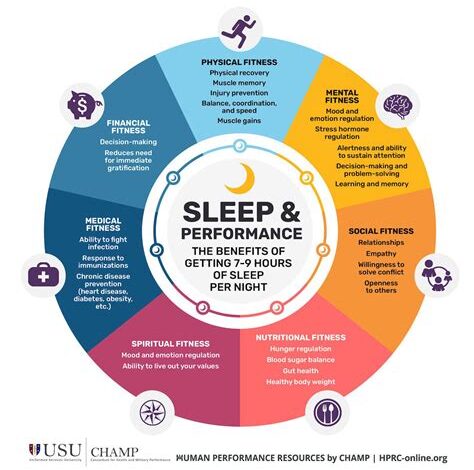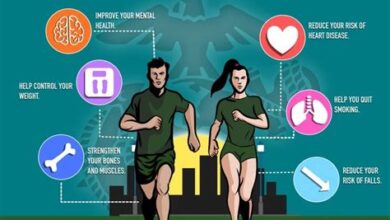The Role of Sleep in Physical Health and Recovery

Discover the importance of quality sleep and its effects on physical health, muscle recovery, immune function, and optimizing sleep for physical well-being.Getting enough quality sleep is crucial for maintaining physical health and promoting recovery. In today’s fast-paced world, it’s easy to prioritize work, socializing, and other activities over sleep, but the consequences of sleep deprivation can be severe. In this blog post, we’ll explore the various ways in which sleep plays a critical role in physical health and recovery. From its impact on muscle recovery to its influence on immune function, sleep is a vital component of overall well-being. We’ll delve into the importance of quality sleep, the effects of sleep on physical health, the role of sleep in muscle recovery, and how optimizing sleep can contribute to better physical health. So, if you’re someone who is serious about maintaining a healthy and active lifestyle, read on to learn more about the powerful effects of sleep on your physical well-being.
Importance of Quality Sleep
Sleep is an essential component of overall physical health and well-being. Quality sleep is crucial for numerous bodily functions, including maintaining a healthy immune system, regulating hormones, and supporting cognitive function. When we prioritize getting enough high-quality sleep, we are setting the stage for improved physical health and overall wellness.
One of the key benefits of quality sleep is its effect on our immune system. During sleep, our bodies produce cytokines, a type of protein that helps combat infection and inflammation. Without adequate sleep, our bodies may not be able to produce enough cytokines to effectively fight off illness. This can leave us more susceptible to infections and other health issues.
Additionally, research has shown that getting enough quality sleep can help improve physical performance and muscle recovery. During sleep, our bodies have the opportunity to repair and build muscle tissue, as well as restore energy stores. This is particularly important for athletes and individuals who engage in regular physical activity, as it can contribute to better overall physical health and performance.
Effects of Sleep on Physical Health
Quality sleep is a vital component of maintaining good physical health. Lack of adequate sleep can lead to a number of health issues such as obesity, heart disease, and diabetes. When we are sleep deprived, our body produces less leptin, a hormone that suppresses appetite, and more ghrelin, a hormone that stimulates hunger, leading to overeating and weight gain. In addition, poor sleep can negatively impact the body’s ability to regulate insulin, which can increase the risk of developing type 2 diabetes.
Moreover, sleep plays a crucial role in supporting the immune system. During sleep, the body produces and releases cytokines, a type of protein that helps the immune system fight off infection and inflammation. When we don’t get enough sleep, the production of these protective cytokines is reduced, making us more susceptible to illnesses and infections. Furthermore, chronic lack of sleep can also lead to an increase in stress hormones, which can weaken the immune system, making it harder for the body to fight off viruses and bacteria.
Furthermore, sleep is essential for the body to repair and regenerate itself. It is during sleep that the body carries out essential maintenance processes, such as muscle repair, tissue growth, and protein synthesis. This is especially important for athletes and individuals who engage in physical activity, as adequate sleep is necessary for muscle recovery and overall physical performance. Without enough sleep, the body is unable to repair and rebuild muscle tissue effectively, which can lead to decreased muscle strength and endurance.
Role of Sleep in Muscle Recovery
Sleep plays a crucial role in the recovery and repair of muscles. When we sleep, our body produces growth hormone, which is essential for muscle growth and repair. During deep sleep, our muscles also undergo repair and regeneration, helping them to recover from the wear and tear of daily activities and exercise.
Additionally, lack of sleep can hinder the body’s ability to recover from physical exertion. When we don’t get enough sleep, our muscles do not have enough time to repair and rebuild, leading to increased risk of injury and decreased muscle strength and endurance.
Optimizing sleep quality and duration is therefore essential for muscle recovery and overall physical health. Incorporating good sleep habits, such as maintaining a regular sleep schedule, creating a conducive sleep environment, and managing stress, can all contribute to better muscle recovery and improved physical well-being.
Sleep’s Impact on Immune Function
Quality sleep is essential for overall physical health, including the functioning of the immune system. When we don’t get enough sleep, our immune system is weakened, making us more susceptible to infections and illnesses. Lack of sleep can also affect the immune system’s ability to respond to vaccines, reducing their effectiveness.
During sleep, the body produces and releases cytokines, a type of protein that helps the immune system fight inflammation, infection, and trauma. Without adequate sleep, the production of these protective cytokines may decrease, leaving the body more vulnerable to illnesses. Chronic sleep deprivation can also lead to long-term inflammation, which is linked to a variety of health issues, including heart disease, diabetes, and autoimmune conditions.
Furthermore, sleep deprivation can alter the balance of important immune cells and antibodies in the body, impacting its ability to defend against harmful pathogens. It’s clear that quality sleep plays a crucial role in maintaining a strong and efficient immune system, and prioritizing adequate sleep is essential for overall physical well-being.
Optimizing Sleep for Physical Well-being
Sleep plays a crucial role in our physical well-being, affecting everything from our energy levels to our immune function. Quality sleep is essential for optimal physical health, as it allows our bodies to repair and recharge, helping to prevent injury and illness. Without enough rest, our bodies are unable to effectively recover from the day’s activities, which can lead to chronic fatigue, decreased performance, and increased risk of injury.
In addition to physical health, adequate sleep is also vital for muscle recovery. When we sleep, our bodies produce growth hormone, a key factor in muscle repair and growth. This makes sleep an essential component of any fitness or training regimen, as it allows the body to rebuild and strengthen muscles after exercise. Without proper rest, the body is unable to fully recover, leading to decreased muscle performance and increased risk of overuse injuries.
Furthermore, sleep plays a critical role in immune function, helping to defend the body against illness and infection. During sleep, the immune system releases proteins called cytokines, which help to promote sleep and fight off infection. Without enough rest, the body’s immune system is compromised, leaving us more susceptible to colds, flu, and other illnesses. By prioritizing quality sleep, we can help strengthen our immune function and reduce the risk of getting sick.





